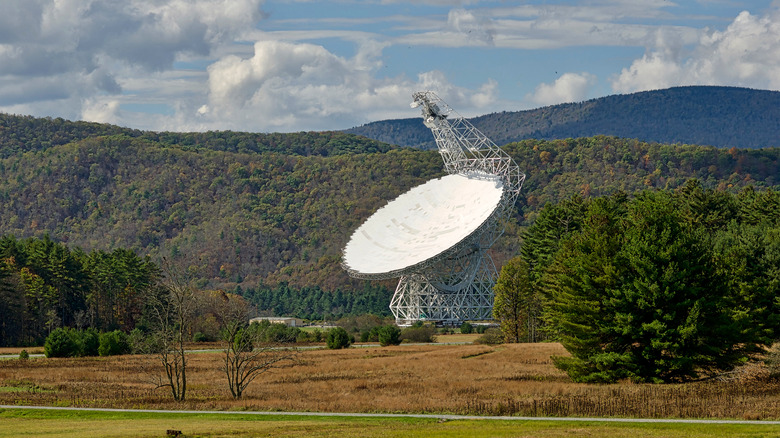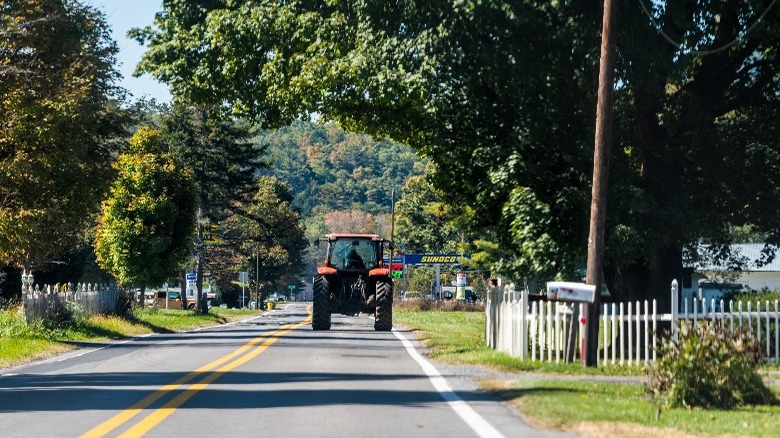The Real Reason That Wi-Fi Is Banned In This American Town
Fast Wi-Fi is increasingly an expectation in American cities and towns. According to HighSpeedInternet.com, the average Wi-Fi speed across the country is 99.3 Mbps – plenty fast enough to stream movies in HD and download small files relatively quickly. Combined with the proliferation of cellular networks, U.S. residents are able to connect to the internet nearly everywhere they go.
The town of Green Bank, West Virginia, is sort of an exception to the rule. The tiny hamlet with about 182 full-time residents sits in a lush valley south of Monongahela National Forest. Here, in the rural Allegheny Mountains, the hustle and bustle of city life are all but forgotten. The town hosts but a few restaurants and shops, mostly within its small town center. The nearby Green Bank Observatory is lined with hiking trails easily routable via HikingProject. The observatory is among the region's top employers, with 100 full-time employees and an additional 40 during the busy summer season – nearly the population of the entire town.
It's this same observatory that prevents the town from having access to Wi-Fi.
Why Wi-Fi is banned in Green Bank, West Virginia
The Green Bank Observatory is home to the massive Green Bank Telescope, operated by the National Science Foundation since 1957. This site is among the most important places in the United States for studying what lies beyond the reaches of our planet. Among other feats, the Green Bank Telescope is responsible for an incredibly detailed image of the moon's Tycho Crater and discovering the largest neutron star ever recorded.
Above you'll see a tour of the facility, as published in February of 2022. This video was originally recorded to be shown as a "virtual tour" of the Green Bank Telescope (GBT) for a STEM Festival, but is available now to the public on YouTube.
The telescope, along with other scientific equipment at the observatory, detects faint signals from outer space, according to Popular Mechanics. Because of the sensitive nature of the equipment, distracting signals such as those produced by Wi-Fi networks are effectively banned in the town. Part of the ban is on the books as a 13,000-square-mile National Radio Quiet Zone (NRQZ). The FCC and NTIA created the NRQZ back in 1958, as shown in documentation at the National Radio Astronomy Observatory. The NRQZ covers a large portion of West Virginia and overlaps into Maryland and Virginia. The ban restricts some electrical signal use and is largely the reason you're unable to find a cell signal outside of the largest city centers. Wi-Fi, Bluetooth, and similar electrical signal use are not banned in this area.
Another exclusion zone covers the 10-mile radius around the observatory called the West Virginia Radio Astronomy Zone (WVRAZ), as shown in the West Virginia Legislature's "Radio Astronomy and Zoning Act" still in force today. The WVRAZ is the more restrictive of the two areas, banning the use of Wi-Fi, cellular connectivity, Bluetooth, and other signals with electrical emissions above a certain threshold.
Is Green Bank off the grid? Sort of
Back in 2015, Washingtonian reported that residents of Green Bank were not allowed to use cell phones or other forms of modern technology that could disrupt the work of the telescope. The remote nature of the town, and the ease of falling "off the grid" here, were said to make Green Bank a hot spot — pun intended — for technophobes looking to distance themselves from the digital era. Fast forward several years and you'll find the Green Bank Observatory website's description of how internet connectivity is most certainly available in the nearby town, if you know where to look.
"Internet is provided to homes, schools, and businesses using legacy copper phone lines," wrote Jill Malusky, Public Relations for the Green Bank Observatory. "A lack of maintenance on these lines, and no updates or modernization of equipment, means that the internet in this region falls well below standards of service designated by the Federal Communications Commission (FCC). All of these challenges have made it difficult to attract new ISPs to improve service." So while the Green Bank Observatory is the main reason why internet access is limited in the area, it is this same organization that's spearheading efforts to make sure access to the outside world is available to all citizens. "Internet access is fundamental to the work of the Green Bank Observatory, and our staff work closely with area schools, libraries, businesses, and local government to advocate for improved internet for the region."
Anyone fancying a trip can pay a visit to the observatory. Administration at the observatory encourage visitors to take tours and have a fully working and often-updated website and social media presence, too.


